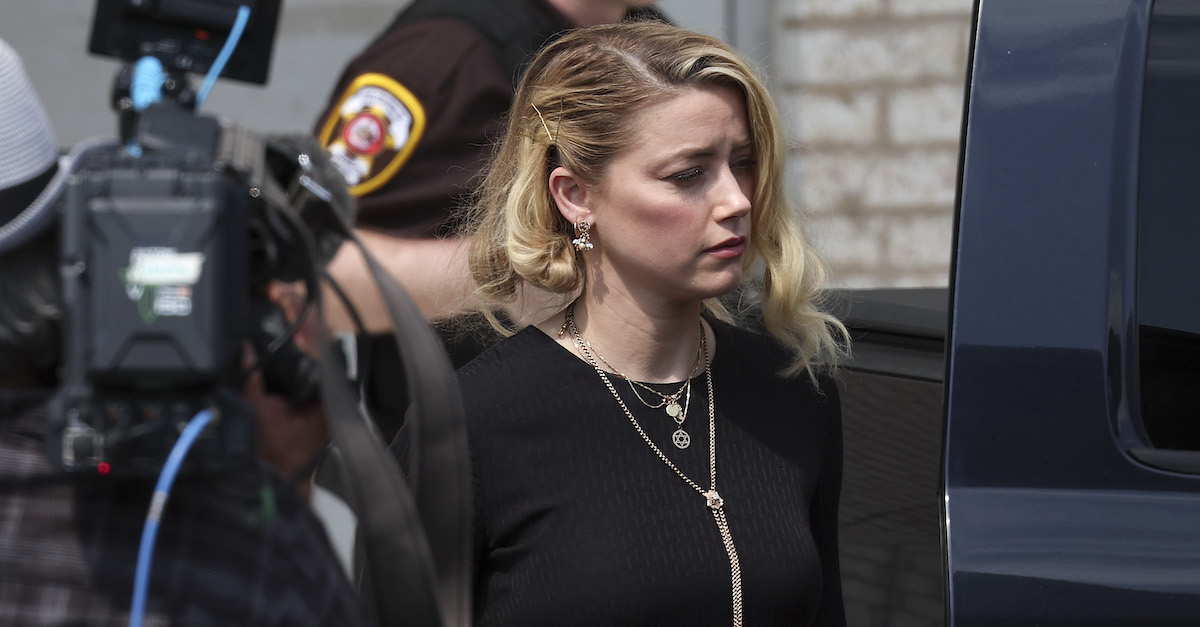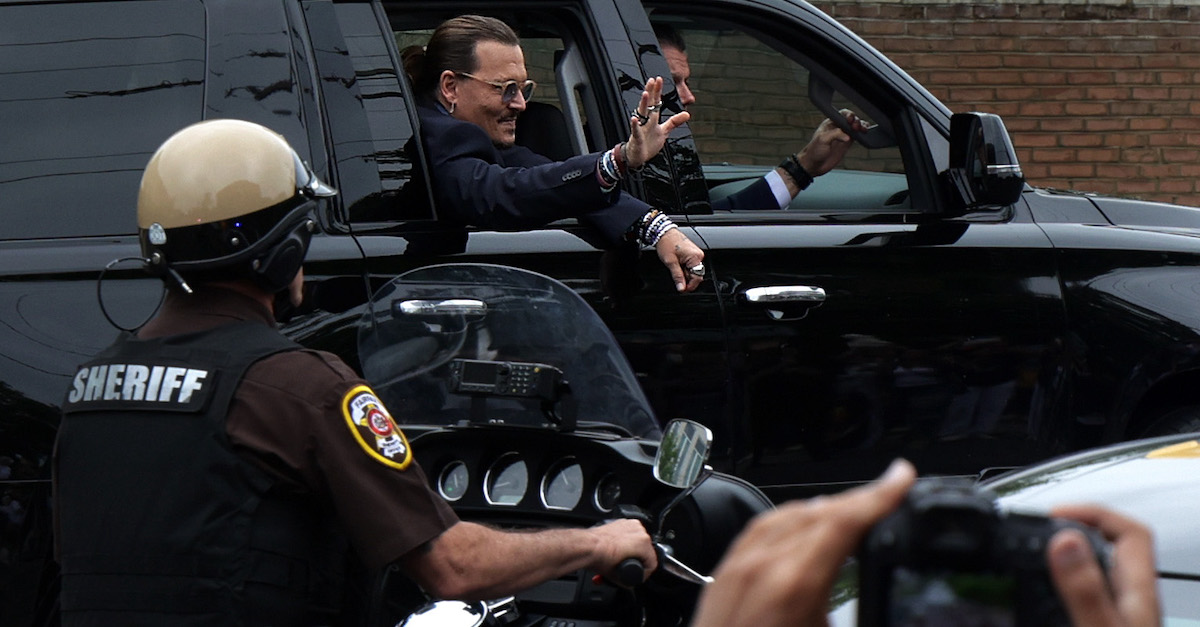
Actress Amber Heard departs the Fairfax County Courthouse on June 1, 2022 in Fairfax, Virginia. (Photo by Win McNamee/Getty Images.)
Amber Heard cannot easily use federal bankruptcy laws to avoid paying millions of dollars to actor Johnny Depp, but she might be able to use a bankruptcy proceeding to slow down the payments. That’s according to a law professor and expert on the subject who said the latter possibility is a risky one for Heard — should the Aquaman actress choose that path.
A state court jury in Virginia decided Wednesday afternoon that Heard defamed Depp three times over again via a Washington Post op-ed. While some have complained that the jury’s first finding of defamation involved a headline that Heard’s legal team asserted Heard never wrote, the bottom line is that the jury apparently didn’t believe most of Heard’s testimony and determined Heard needed to pay Depp $10 million in compensatory damages and $5 million in punitive damages for the defamation. The presiding judge immediately limited the punitive damages award to $350,000 under a Virginia law that caps punitive damages to that amount.
The jury shot down two of Heard’s counterclaims against Depp but ruled that Adam Waldman, a lawyer who was acting as an agent of Depp, defamed Heard just one time. That determination resulted in a counter-award of $2 million in compensatory damages and no punitive damages due from Depp to Heard.

Actor Johnny Depp waves to supporters from his vehicle as he leaves a Fairfax County Courthouse May 27, 2022 in Fairfax, Virginia. Depp was not in the courtroom for the verdict, but he was said to have been watching the proceeding remotely from the United Kingdom. (Photo by Alex Wong/Getty Images.)
The issue is whether any money will indeed change hands. While Heard has promised to appeal the underlying legal rulings in the case, she likely cannot use bankruptcy law to shield herself from having to pay Depp, according to Bruce Markell, a professor of bankruptcy law and practice at the Northwestern Pritzker School of Law in Illinois. Markell is also a former bankruptcy judge.
The analysis starts with § 523(a)(6) of bankruptcy law. It says that a “discharge” of debts under various other sections of the law “does not discharge an individual debtor from any debt . . . for willful and malicious injury by the debtor to another entity or to the property of another entity.”
In other words, bankruptcy law protects individuals from debts they incur, but it also protects some people who have valid claims against debtors. An alternative — where debtors could escape liability for intentional torts by simply filing for bankruptcy — would effectively neuter large swaths of the legal system. As a general legal axiom, tort judgments are designed to force wrongdoers to pay for the injuries they inflict, and that premise generally cannot be avoided by bankruptcy.
“Most tort judgments based on negligence (car accidents, slips and fall, etc) are dischargeable” in bankruptcy, Prof. Markell noted. “Indeed, even medical and legal malpractice cases are dischargeable.”
“What separates Heard’s case from regular tort cases is the finding of intent,” he continued. “Bankruptcy law does not permit most intentional torts (battery, assault, etc.) to be discharged. Defamation fits in due to the required findings of malice or intent to injure another.”
“I think there are at least two reasons why bankruptcy would not be helpful to Ms. Heard,” Professor Markell told Law&Crime via email.
His first rationale involves a bit of a dive into the congressional intent behind bankruptcy law (we’ve very lightly edited the response):
Damages for defamation (whether general or punitive) are generally held to be non dischargeable under § 523(a)(6)’s standard of “willful and malicious.” The congressional history of “willful” indicates it means “deliberate or intentional.” “Malicious” means a conscious disregard of one’s duties or without just cause or excuse; it does not require ill-will or specific intent to do harm. To paraphrase Collier on Bankruptcy, most courts have held that a wrongful act done intentionally, which necessarily produces harm or which has a substantial certainty of causing harm and is without just cause or excuse, is “willful and malicious” within the meaning of section 523(a)(6).
This standard would cover even the general damages awarded to Mr. Depp. Put another way, the standard for punitive damages is stricter than the standard for willful and malicious; while all punitive damages are generally deemed willful and malicious, not all willful and malicious damages equate to punitive damages. Thus, it is quite likely that the entire judgment, not just the punitive damages portion, would be non-dischargeable [in a hypothetical bankruptcy proceeding].
If that’s correct, Ms. Heard would gain no real benefit from filing bankruptcy. She’d have to pay in full the setoff between Depp’s $10,350,000 in damages and her $2,000,000 award.
That would come out, as Law&Crime noted yesterday, to an $8,350,000 payment from Heard to Depp.
Professor Markell continued:
She [Heard] might gain procedural advantage in filing a chapter 11 in that she could propose to pay the award over time, much like Texaco proposed to pay Pennzoil’s damages [in the late 1980s] (Texaco was solvent, but could not pay [a] $10+ billion damage award immediately, so it filed a chapter 11 plan to settle the claim and pay it over time).
Some commentators have suggested that Heard may be able to use bankruptcy proceedings to avoid the compensatory damages award but would remain on the hook for the $350,000 reduced punitive damages award. However, for the aforementioned reasons, Prof. Markell disagrees with that assessment.
The second reason Markell said Heard likely would not benefit from filing for bankruptcy is as follows:
The second reason is speculative, and builds on the last paragraph. If a person can pay his or her debts, they should. If Ms. Heard has the financial wherewithal to pay the judgment, filing bankruptcy to stall or reduce the payments could be viewed as bad faith (this theory is at play in the [Johnson & Johnson] talc cases presently before the 3d Circuit). But I have no idea about Ms. Heard’s present or future financial condition — or Mr. Depp’s desire to enforce fully the judgment. Were he to offer terms that fit Ms. Heard’s finances, the justification for bankruptcy is much lessened. But that’s for the future.
Beyond questions about Heard’s financial situation, it remains to be seen whether Depp will actually try to collect the amount the jury said he is owed.
[Editor’s note: this report has been updated with additional comments from Prof. Markell.]